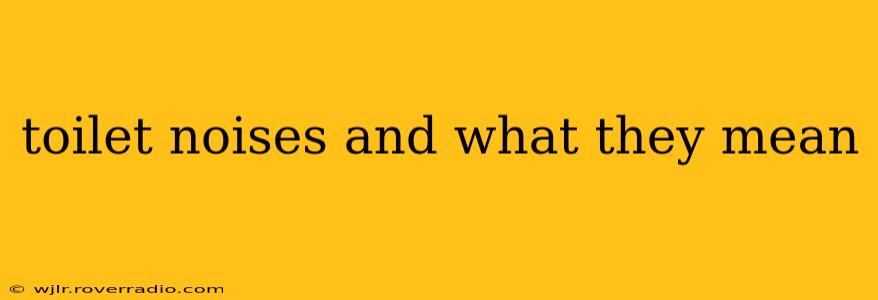Your toilet. A seemingly simple appliance, yet its plumbing orchestra can play a symphony of sounds, some reassuring, some… less so. Understanding these sounds can save you from potential plumbing nightmares and costly repairs. This guide will delve into the common toilet noises and what they signify, helping you diagnose the problem before it becomes a major issue.
What Causes Different Toilet Noises?
Toilet noises usually stem from issues within the tank or the bowl itself. The most common culprits are problems with the fill valve, flapper, chain, and the internal workings of the toilet. Let's explore the most frequently heard sounds and their likely causes.
1. Running Toilet: What Does a Constantly Running Toilet Mean?
This is perhaps the most frustrating toilet noise. A running toilet wastes water and money. The culprit is often a faulty flapper or fill valve.
-
Faulty Flapper: The flapper is a rubber seal at the bottom of the tank that controls water flow into the bowl. If it doesn't seal properly, water will constantly leak into the bowl, resulting in a constant running sound. You might notice water consistently trickling into the bowl.
-
Faulty Fill Valve: The fill valve is responsible for refilling the tank after each flush. If it malfunctions, it might not shut off properly, leading to a continuous running sound.
2. Hissing Sound from the Toilet Tank: What's the Meaning of a Hissing Noise?
A hissing sound often indicates a problem with the fill valve. Air might be trapped in the valve, or it could be malfunctioning and struggling to regulate water flow.
3. Clicking or Gurgling Sounds from the Toilet: What Could This Indicate?
Clicking sounds are often linked to the fill valve mechanism. The clicking might mean the valve is trying to engage but isn't functioning correctly. Gurgling sounds can indicate a blockage or air trapped in the drain line.
4. High-Pitched Whistling Noise from the Toilet: What is this Noise Telling Me?
A high-pitched whistling noise often points to a problem with the fill valve or the water supply line. This is typically due to high water pressure. A reduced water pressure regulator could fix this problem.
5. Banging or Slamming Sound in the Toilet: What are the Possible Causes?
This is often due to the fill valve slamming shut forcefully after filling the tank. This can be caused by water pressure issues.
6. Toilet Not Flushing Properly: What are the Signs of a Problem?
A toilet that doesn't flush properly, even with multiple flushes, often indicates a clog in the bowl or drain line. This is usually accompanied by gurgling or other unusual sounds.
7. Frequent Flushing Needed: What Does This Mean?
If you need to flush the toilet multiple times to clear the waste, this signifies an issue with the flush valve or a problem with the bowl's design – especially if the toilet is older.
Troubleshooting Your Noisy Toilet
Before calling a plumber, try some basic troubleshooting:
-
Check the flapper: Inspect the flapper for wear and tear. If it's damaged or doesn't seal properly, replace it. These are inexpensive and readily available at most hardware stores.
-
Check the fill valve: Examine the fill valve for any signs of damage or malfunction. If you suspect a problem, consider replacing it.
-
Check the chain: Ensure the chain connecting the flapper to the handle is the correct length and isn't tangled or interfering with the flapper's movement.
When to Call a Plumber
While many toilet noises can be resolved with simple fixes, some issues require professional help. If you've tried basic troubleshooting and the problem persists, or if you notice any significant leaks or unusual smells, it's best to call a qualified plumber.
Understanding the sounds your toilet makes can help you avoid costly repairs and ensure your plumbing system remains efficient. By addressing minor problems early, you can prevent larger, more expensive issues down the road.
